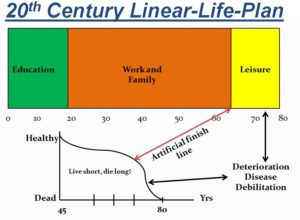Retirement: Where Good Habits Go to Die and Bad Habits Flourish.

For starters this week, click on and read this humorous article “What Day Is it? The Muddled Confusion of a Recent Retiree.”
New blogger and recent retiree, Howard Fishman, takes a very refreshing swipe at the realities of transitioning from labor-to-leisure, vocation-to-vacation.
Fishman makes a seminal statement in the article (the bolding is mine):
“Since retirement, I find myself awash in days bearing little difference from days that came before. Few benchmarks punctuate time. Though busy with a hundred things on an inexhaustible “honey-do” list, nothing seems particularly celebrated if compared to the highs experienced by successful career accomplishments. There’s no discernable movement on my emotional Richter scale.”
I’m reading between the lines on Fishman’s article. This is a guy with an exemplary track record in executive management at the Fortune 500 level. Could we agree that he is whimsically lamenting a lost identity? From Richter scale strokes to no Richter scale. From a schedule with substance and impact to a – hmm, what schedule?

Many enter retirement because they’ve somehow been convinced to want to get away from having their personal Richter scale moved, even though, in the long run, positive Richter scale movement is certainly healthier than no movement.
Let’s be honest, most people retire “from something”, rarely “to something”.
Unless, of course, the interpretation of “to something” is sleeping-in, marathon TV, garage cleanup, dog walking and golf with the same un-benchmarked cronies every week.
As a culture, we are deeply brainwashed to believe that retirement is a life-portal entitlement – or obligation. To not retire is to be tagged as “unfortunate”; to retire early is to be tagged with a “badge of honor.” To admit that you are “flunking” retirement will rarely leave the lips of a retiree, especially from the male-type.
To denounce retirement is blasphemous. It’s an attack on one of the strongest – and biologically/emotionally/physically unsound – mindsets in our culture. Take this from a seasoned blasphemer.
Lost identity may be one of the most common, most unplanned-for, and most devastating of the myriad downsides to a traditional retirement.
Six months ago, you were:
- “Somebody” to a large group
- Titled
- Respected
- Turned to for advice
- Tightly scheduled with deadlined projects
- Learning something new continuously to thrive in your job
- Bringing in a paycheck as a sign of achievement.
Today:
- You are “somebody” to spouse and progeny, and not much more.
- Your title? Retired – which derives from the French verb “retirer” that means to “retreat or go backward”.
- Still respected – but, as with “somebody”, that circle of respect has shrunk mightily. Face it, the people who respected you at work forgot about you 60 minutes after the last piece of retirement cake was served. They are moving on. And, to your surprise, they aren’t calling you to “stay in touch” which they promised to do as they sucked down your retirement cake.
- The advice you are asked for now? Probably not brain stretchers. Things like “what’s the best way to clip the dog’s toenails” or “who do you recommend for a tree-trimming service?” or “would you recommend a 20-degree or 23-degree loft hybrid?”
- You’re mostly unscheduled. After all, that’s why you retired, right? For the freedom of controlling your own time. The honey-do list is done by noon, and you find yourself wandering through the garage looking for something to break so you can fix it. No magnitude, no hard deadlines to challenge your talents, lots of open time to be sucked into intellectual pursuits such as the 49 hours-per-week the average retiree spends zoning out in front of the TV.
- Learning? Be honest, you’re taking a sabbatical from learning, which, for many, becomes permanent. A been-there, done-that attitude prevails.
- No paycheck – and the question “what am I worth now?” It’s all going out, nothing coming in.
The emerging dark sides of retirement that are the consequences of the above are well documented. I’m not going to bother you with them again. Click on my May 14 blog “Avoiding Retirement Chaos” for a refresher.
BEWARE the free time.
A study from Taiwan said the key to a happy retirement isn’t how much free time you have, it’s how you manage whatever free time you have. Free time -the very thing we covet in moving to retirement – is a Trojan horse. Free time can lead to loss of good habits which in turn, over the long term, can lead to early mental and physical deterioration.
Good habits like: regular exercise; social engagement; healthy diet; continued learning; service to others, spiritual development.
An unplanned, no-purpose retirement can move us to the “live short, die long” lifestyle that pervades our society, where post-retirement health and vitality gradually fade away and prolonged frailty sets in. It’s largely a choice resulting from the misuse of our time and true talents during this period between middle age and true old age.

A new prestige
As Boomers move into and past middle-age, we are seeing a gradual shift away from the notion that retirement makes sense. I predict that no-retirement/un-retirement or, at a minimum, semi-retirement will become the new prestige.
Howard Fishman perhaps illustrates the new model – one unwilling to “go quietly into the night nursing home.”
Six months into his “traditional retirement”, he admits to needing a “do-over” and a “decompression from the whirlpool of work.” He has realized that “it’s less about how to fill the days and more about self-fulfillment to be found in those days.”
And his do-over will include “finding that old box of Crayolas and start to draw outside of the lines – just for spite and just once, for kicks – like that crazy Kindergarten kid who imagined that the sun and planets all revolved around him.”
Ah yes – resurrecting the innate creativity siphoned off by 30+ years of meeting cultural expectations.
For the Howard Fishman’s, it’s more likely to be a third-act lifestyle filled with:
• Mentoring, not movies
• Teaching, not TV
• Learning, not Lazy-Boy
• Biking, not bingo
• Philanthropy, not pickleball
• Vocation, not vacation
• Contrarian, not conformist
• Playground, not park bench
Good habits, leaving no room for bad habits.
Retired? Relative to the above thoughts, how has your retirement gone? What can you share for prospective or early retirees that can help them make this “third act” life portal the happiest, most fulfilling and productive time of life? Scroll down and leave us your thoughts – or email me at gary@makeagingwork.com. Or better yet, call me 720-344-7784 – I’d love to chat with you about this.





Fabulous!. Thank you.
One point- I’m realizing that I need to have an elevator speech to recite when I hear, “So, you’re retired?”
Yes, after a few cursory remarks about not being retired, I get to my new job- website, blogs, book writing, etc. But it would be good to say something succinct about the benefits of avoiding retirement.
Thoughts?
pat
Pat, re the elevator speech; how about something along the lines of “I’ve retired from GOOD work (because it was time and I needed more freedom) to even BETTER work where I can turn what I learned and experienced around and pay it back to the profession that I love so deeply.”
You’ve chosen a “freedom lifestyle with vision and purpose” instead of “retirement”.
Pat, re the elevator speech: How about something along the lines of “I’ve moved from GOOD WORK (because it was time and I needed more freedom) to even BETTER WORK where I can turn what I learned and experienced back around to further serve the profession I love so deeply.”
You’ve moved to a “freedom lifestyle with purpose” instead of a “retirement.”
Gary, thanks for referencing my article! If I had one good piece of advice it would be this: planning for life inside of retirement is a good thing – HOWEVER – take a well-deserved vacation and rest after leaving work. And not 2 weeks. That isn’t enough. Be kind to yourself and allow whatever thoughts that creep into your mind to be heard and vetted. The planning you did before retirement might not be 100 percent resonant in the third act.
Thanks Howard – great advice. Perhaps something like a “gap year”, right?
I agree – like any planning, surprises and twists and turns are inevitable so flexibility and resilience are going to be key in the third act.
Some genuinely nice and useful information on this internet site, likewise I conceive the design and style contains superb features.
Dear makeagingwork.com webmaster, You always provide great resources and references.
Dear makeagingwork.com admin, Your posts are always well researched and well written.
Dear makeagingwork.com admin, Your posts are always well-written and easy to understand.
Hi makeagingwork.com owner, Thanks for the informative and well-written post!
Hello makeagingwork.com owner, Your posts are always well-referenced and credible.
Hi makeagingwork.com administrator, Your posts are always well-structured and logical.
Dear makeagingwork.com webmaster, You always provide great information and insights.
Hello makeagingwork.com webmaster, You always provide great examples and real-world applications, thank you for your valuable contributions.
Dear makeagingwork.com owner, Good to see your posts!
Hi makeagingwork.com webmaster, Keep the good content coming!
Hi makeagingwork.com administrator, Thanks for the well-structured and well-presented post!